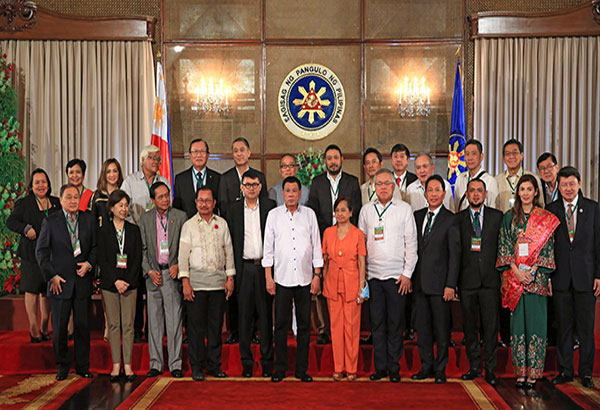BOI readies new 2-year IPP

NEGOSYO PARA SA KAPAYAPAAN SA SULU: President Rodrigo Duterte led the Christmas Townhall last Dec. 19, which launched the project, Negosyo Para sa Kapayapaan sa Sulu of the Departments of Agriculture and Trade and Industry, and Go Negosyo. More than 400 entrepreneurs, advocates, mentors and government officials joined the celebration of inclusive growth. In line with Go Negosyo’s Kapatid Angat Lahat program, Negosyo Para sa Kapayapaan sa Sulu encouraged big brother companies to help and contribute in building an active socio-economic environment in Sulu. Many corporations and entrepreneurs have pledged their support in the plans of development in Sulu. In photo are (second row, from left) Merly Cruz of Go Negosyo, Robina Gokongwei-Pe of Robinsons Retail Holdings, Marissa Concepcion, Tony Meloto of Gawad Kalinga, George Barcelon of the Philippine Chamber of Commerce and Industry, Michael Tan of the LT Group and Asia Brewery Corp., Manny Osmena of the Manny O. Group, Luis Oquinena of Gawad Kalinga, Mike Toledo of MVP Group of Companies Media Bureau, Joseph Chua of Macroasia Corp., Babe Romualdez of Stargate Media Corp., Sammy Uy of Davao Import Distributors Inc., Alfredo Yao of Zesto Corp. and William Belo of Wilcon Depot.(1st row, from left) Manny Pangilinan of the MVP Group, Teresita Sy-Coson of SM Investments Corp., Peace Process Secretary Jess Dureza, Agriculture Secretary Manny Piñol, presidential adviser Joey Concepcion, President Rodrigo Duterte, former president Gloria Macapagal-Arroyo, Trade and Industry Secretary Ramon Lopez, Datu Shah Bandar Abdusakur Tan, Gov. Abdusakur Tan II of Sulu, Ginggay Hontiveros and Henry Lim Bon Liong of SL Agritech Corp.
MANILA, Philippines – The Board of Investments will finalize next week a new investment priorities plan (IPP) which will include the construction of drug rehabilitation facilities, environment and climate change-related projects, and public-private partnership projects to be undertaken by local government units.
Trade Secretary and BOI chair Ramon Lopez said the 2017-2019 IPP would be submitted to President Duterte once everything is finalized.
Lopez expects the President to sign the IPP before the year ends.
The IPP is a list of priority investment activities that are qualified to be given incentives.
“We’re adding new areas and we’re deleting some,” Lopez said.
Other key additions to the IPP are inclusive business projects or those that integrate the poor in their core business operations.
Lopez said incentives previously given to housing projects in Metro Manila would likely be removed under the new IPP.
“So only projects outside Metro Manila would qualify for incentives. But there will be a cap, as housing projects beyond P2 million would not be entitled anymore,” he said.
As far as tourism accommodation projects are concerned, all locations except in Boracay will be open for incentives.
“Developers are already investing there so no need to provide incentives there anymore,” Lopez said.
Preferred activities listed in the 2014-2016 IPP include manufacturing, agribusiness and fishery, services, economic and low-cost housing, hospitals, energy, public infrastructure and logistics, and PPP projects.
The BOI said the draft 2017 IPP has set specific objectives that will make investments more relevant to the economy and the society.
The preferred list of activities will be entitled to fiscal and non-fiscal incentives under EO 226 otherwise known as the Omnibus Investments Code of 1987, as amended, provided they qualify certain criteria and fulfill the terms and conditions of registration with BOI.
As early as March this year, the BOI has started the review of the proposed IPP and has also conducted multi-sectoral consultations in Metro Manila, La Union, Laguna, Cebu, Iloilo, Zamboanga, Davao, and Cagayan de Oro.
“The IPP is structured to be more relevant to the aspirations and current socio-economic needs of the Filipino people as it lays down a solid foundation for more inclusive growth through innovation and pro-poor business models. It has considered the administration’s advocacy to support small enterprises, encouraging their integration to major business networks through innovation-driven growth models, and thus seeks to expand the middle-class by raising quality of life of the poor,” Lopez said.
- Latest
- Trending





























